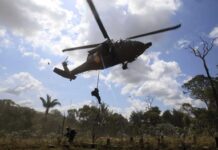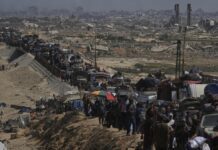
Latvian Foreign Minister Baiba Braže says her country “supports” Trump’s efforts to make peace between Ukraine and Russia, but says NATO “will have to push Russia to peace.” Mehmet Futsi/Anadolu via Getty Images/Getty Images hide caption
toggle caption
Mehmet Futsi/Anadolu via Getty Images/Getty Images
At a press conference at the NATO Summit in the Netherlands on Wednesday, President Trump said the alliance was “not a rip off,” showing a marked difference in tone in how he talks about the organization.
In an interview with NPR’s Morning Edition, Latvian Minister of Foreign Affairs Baiba Braže agreed with the president, saying “NATO is not a rip-off. It’s a collective defense alliance, and President Trump knows it very well just like all the other presidents of the US and all the other administrations.”
During her conversation with NPR’s Steve Inskeep, Braže gave no criticisms of Trump’s approach to NATO, Russia and Ukraine, making her case that NATO is a necessary bulwark against aggression from Russia.
This interview has been edited for length and clarity.
Interview highlights
Steve Inkseep: Your country is in a position where you need to take this even more seriously, perhaps, than others do. Do you think that this commitment to raise defense spending to 5% – including infrastructure spending – is serious, is real, is going to happen, and is sufficient to confront Russia if necessary?
Latvian Minister of Foreign Affairs Baiba Braže: Listen, I will fact-check you saying we are more vulnerable than others. I think all countries are subject to Russian sub-conventional attacks already now. That means cyber, that means sabotage, that means killings of certain people. Remember Skripal attack in UK which also had a use of chemical weapon? There are variety of activities that Russia is doing. So we have to be very sure that we know that we have that intelligence cooperation between military and civilian intelligence, and that we have that situational awareness about what Russia is doing in all respects, not only militarily – meaning where it’s moving it’s troops, how it’s attacking Ukraine, what is Ukraine doing, where is Russia’s vulnerabilities – but also about internal security. We have to be very, very sure what is happening. And that’s what we all are doing within the alliance. We are sharing intelligence.
Inskeep: How have you viewed President Trump’s efforts across this year…? I mean, it almost seems like there’s been several phases – he’s tried to make an accommodation with Russia, he yelled at Volodymyr Zelenskyy, the president of Ukraine, he then seems to have repaired relations with Zelenskyy, he seems to be getting more frustrated with Russia. Hard to say where things stand now. How have you viewed all of this?
Braže: Listen, we fully, fully support President Trump’s efforts to reach just and lasting peace in Ukraine. Ukraine wants that peace most of all. We all want it. Russia’s aggression was totally without any justification, it was without any reason, so it has to stop. But there is a catch: Currently, we are not seeing any indication that the butcher in Kremlin really wants to stop anything. So to get to peace, we will have to push Russia to peace.
Inskeep: Well, that’s an interesting thing. I suppose it’s possible that from your perspective, it could be good that President Trump reached out to Russia because you discover whether that’s possible or not, and maybe it’s not possible.
Braže: All of us, all allies watch Russia closely, and we follow the indications. And, neither on the military side, nor on political, economic side, religion, you know, private sector – there’s not a single indicator that it’s turning into pro-peace type of system. It’s all pro-war currently. So that’s why there are three lines of effort that we discussed at the summit, where we have to be strong as allies – and that’s nationally, and collectively as NATO. Second is weakening Russia, so going after Russia’s oil income, gas income, other exports, technology not being provided to Russia – there, China is a main enabler, as we all know. And third is to keep supporting Ukrainian self-defense. Ukrainians are heroic people, and Russia has not succeeded. Just think, it’s more than three years of war – more than a million Russian soldiers killed or severely wounded. And they have not even progressed to the Dnipro River.
Inskeep: Do you think that your side, right now, taking everything into account, is winning?
Braže: Oh yeah, totally. Absolutely. Listen, it’s a 40 million [population] country that is resisting open aggression against 140 million [population] nuclear state. And that nuclear state has not reached any of its strategic objectives. Ukraine is standing strong as a democracy, it’s the largest army in Europe currently, it has all the technological advancements that it has integrated. I mean, look at the drone attacks that it implemented, it’s really unseen before.












